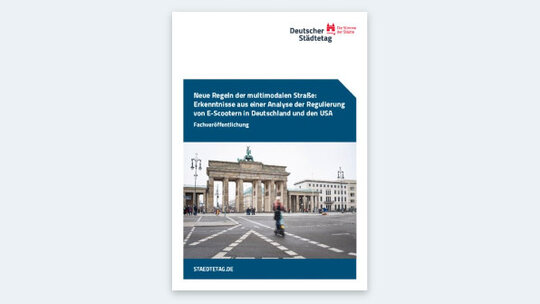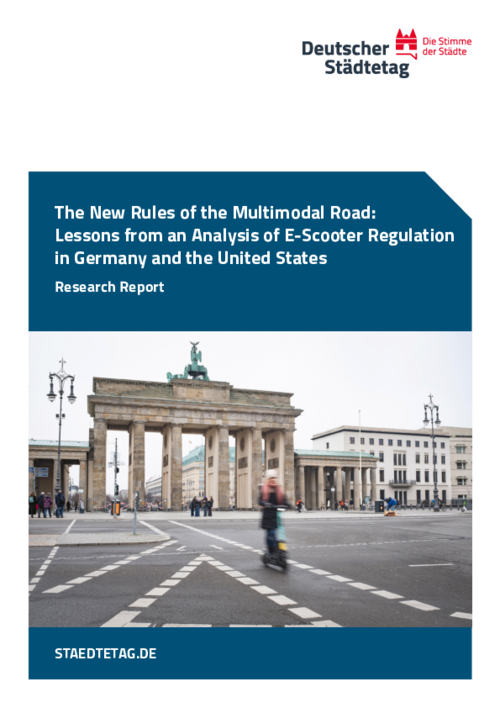The New Rules of the Multimodal Road
Transportation remains an omnipresent, personal and existential issue for individuals. It determines life quality, access to labor, education, leisure and consumption. It is equally regarded as a decisive factor for the “equality of life conditions” in Germany and attributed
to the essential public services (“Daseinsvorsorge”) in Germany at the national, state and local level. As a driver of economic, quality of life, health, social, and environmental outcomes, transportation policy has therefore been a key topic in German cities’ discussion on urban development.
The environmental aspect of transportation, in particular, is growing ever more salient. Since the advent of the “Mobility Transition” (“Verkehrswende”) decades ago, the Association of German Cities (Deutscher Städtetag) and its member cities have been actively shaping the debate on how cities can make mobility policy more climate-friendly. In a seminal position paper in 2018, the Association of German Cities called for “Sustainable Mobility for All”, providing the agenda for the mobility transition from a municipal perspective.
There have already been major changes in the transportation sector since the position paper’s publication. New forms of mobility – such as e-scooters – have hit the road, as this paper will describe. The German federal government has also changed hands, with the new coalition pledging to enable sustainable, efficient, barrier-free, intelligent, innovative and affordable mobility for all. But the federal government cannot go it alone. The states and the cities are essential partners in shaping and implementing sustainable mobility strategies.
To this end, the Association of German Cities has been outspoken on the need for cities’ empowerment to shape their own sustainable mobility. The Association’s positions, have, among other recommendations, called for more federal funding for public transportation, more flexibility for cities in the development and implementation of mobility strategies, as well as more leeway for cities to experiment with sustainable mobility projects.
Additionally, a key component of such municipal experimentation is best-practice sharing and learning from other cities – including those overseas. For example, U.S. cities, too, are taking sustainability matters into their own hands, individually pledging climate commitments, such as to the Paris Climate Agreement and the UN’s Race to Zero campaign.
This publication therefore homes in on one specific aspect of the mobility transition – micromobility – and places it in the context of international best-practice sharing. Rather than prescribing a one-size-fits-all approach, the paper is meant to encourage discussion on the topic by highlighting fundamental questions and providing best practice examples.
It is by leveraging pooled knowledge and exchanging ideas that we can continue down the road of reducing carbon emissions.
Download
-
The New Rules of the Multimodal Road pdf, 10 MB
Lessons from an Analysis of E-Scooter Regulation in Germany and the United States

Deutsche Version der Fachveröffentlichung
Neue Regeln der multimodalen Straße
Neue Mobilitätsformen – wie E-Scooter – sind auf die Straße gekommen und von ihren Investoren mit erheblichem Einsatz von Risikokapital in den Markt gedrückt worden. Die neue Koalition hat sich vorgenommen, nachhaltige, effiziente, barrierefreie, intelligente, innovative und bezahlbare Mobilität für alle zu ermöglichen. Aber der Bund kann ohne die Länder und Städte keine Wirksamkeit entfalten. Sie sind wichtige Partner bei der Gestaltung und Umsetzung nachhaltiger Mobilitätsstrategien. Daher hat sich der Deutsche Städtetag dafür ausgesprochen, Städte zu befähigen, ihre eigene nachhaltige Mobilität zu gestalten.
Zur Fachveröffentlichung